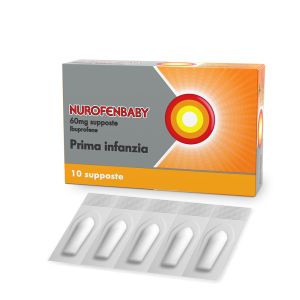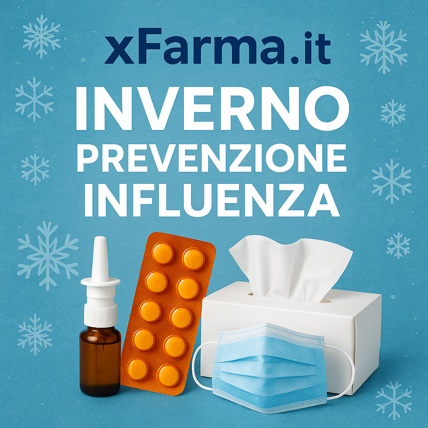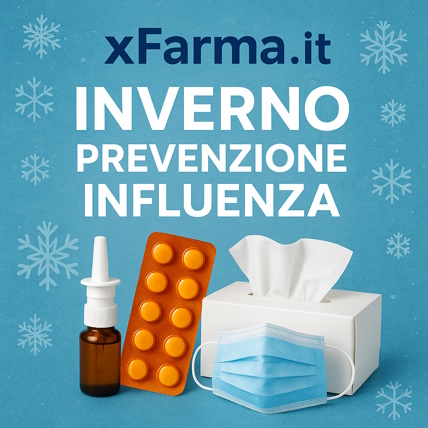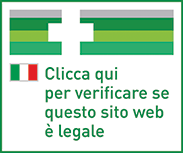Ship in Europe, Find out rates!
Nurofen Baby Early Childhood 60 mg Ibuprofen 10 Suppositories

- box Delivery in Italy in 24/48 and free returns
- star3.000+ positive reviews
- dropboxOver 60,000 products in the catalog
Suppositories for rectal use based on the active ingredient ibuprofen.
Therapeutic indications
Nurodon for children is indicated for the short-term symptomatic treatment of:
- fever
- mild and moderate pain
Nurodon for children is particularly indicated when oral administration is not recommended, eg. in case of vomiting. Nurodon for children is indicated for children from 6 kg (3 months) to 12.5 kg (2 years) of body weight. Nurodon for children contains ibuprofen and belongs to a group of drugs called non-steroidal anti-inflammatory drugs (NSAIDs). The action of these medicines is based on controlling the response to pain and fever.
Dosage and posology
Nurodon for children should be given to babies over 3 months of age and a body weight of at least 6.0 kg. The maximum daily dose of ibuprofen is 20-30 mg / kg of body weight, divided into 3 or 4 administrations during the day. Nurodon for children can be administered on the basis of the following scheme (bearing in mind that the body weight of the child is more important than age in the scheme):
Child weight (Age) | Dose | How many times a day? |
6-8 kg (3 to 9 months) | 1 suppository | To be repeated, if necessary, after at least 6 - 8 hours. Do not exceed 3 suppositories in 24 hours |
8-12.5 kg (9 months to 12 years) | 1 suppository | To be repeated, if necessary, after at least 6 hours. Do not exceed 4 suppositories in 24 hours |
Suppositories should be administered rectally starting from the tip. Before administration it may be useful to warm the suppository in your hands. For short periods of treatment. In infants aged 3 to 5 months, a doctor should be consulted if symptoms worsen or within 24 hours if symptoms persist. If this medicine is required for more than 3 days in children from 6 months of age, or if symptoms worsen, the doctor should be consulted. Talk to your doctor or pharmacist if you think the medicine is working differently than expected.
Overdose
If you use more Nurodon for children than you should tell your doctor immediately. The following signs may occur: nausea, vomiting, stomach pain or more rarely diarrhea. In addition, headache, gastrointestinal bleeding, dizziness, dizziness, somnolence, nystagmus (rapid involuntary eye movements), blurred vision, ringing in the ear, pressure may occur.
Contraindications
Do not use Nurodon for children:
- if you are allergic (hypersensitive) to ibuprofen or other similar pain relievers (NSAIDs) or any of the other ingredients of this medicine
- if you have suffered from shortness of breath, asthma, runny nose (runny nose), swelling of the face and / or hands or hives after using ibuprofen, acetylsalicylic acid or other similar pain relievers (NSAIDs)
- if you have a history of gastrointestinal bleeding or perforation associated with previous NSAID treatment.
- if you have or have had two or more episodes of stomach / duodenal ulcer (peptic ulcer) or bleeding
- if you have cerebrovascular haemorrhage or other types of active bleeding
- if you suffer from unclear disorders of blood formation
- if you suffer from severe dehydration (caused by vomiting, diarrhea or insufficient fluid intake)
- if you have severe kidney, liver or heart failure
- in children weighing less than 6.0 kg (under 3 months of age).
Side effects
Like all medicines, Nurodon for children can cause side effects, although not everybody gets them. Undesirable effects can be minimized by using the lowest effective dose for the shortest time necessary to relieve symptoms. You may experience one of the known side effects of NSAIDs. If this happens, or if you have any concerns about this, stop taking this medicine and tell your doctor as soon as possible.
Stop using this medicine and see your doctor right away if you develop:
- signs of intestinal bleeding such as: severe abdominal pain, dark stools, vomiting with blood or dark coffee grain-like particles;
- signs of very rare but serious allergic reactions such as worsening of asthma, unexplained wheezing or shortness of breath, swelling of the face, tongue or throat, difficulty in breathing, rapid heartbeat, drop in blood pressure leading to shock. These symptoms may also occur when using this medicine for the first time.
- severe skin reactions such as whole body rashes, peeling, blistering or flaking of the skin.
Special warnings
- in the presence of certain skin diseases (systemic lupus erythematosus (SLE) or mixed connective tissue disease
- if you suffer from severe skin reactions such as exfoliative dermatitis, Stevens-Johnson syndrome or toxic epidermal necrolysis. The use of Nurofen for children should be stopped immediately at the first signs of skin reactions, mucosal lesions or any other signs of an allergic reaction.
- if you suffer from an inherited blood formation disorder (e.g. acute intermittent porphyria)
- if you suffer from blood clotting disorders
- in the presence or in case of previous gastrointestinal diseases (ulcerative colitis or Crohn's disease)
- if you have ever suffered from high blood pressure and / or heart failure.
- If you have reduced kidney function
- If you suffer from liver problems
- in the presence of disorders of the rectum or anus
- in case of previous episodes of high blood pressure and / or heart failure
- If you have or have suffered from asthma or allergic diseases, as you may have shortness of breath.
- If you suffer from hay fever, nasal polyps or chronic obstructive breathing disorders there is an increased risk of allergic reactions. Allergic reactions can occur in the form of asthma attacks (so-called "analgesic asthma"), Quincke's edema or urticaria.
- If gastrointestinal bleeding, ulcer or perforation occurs due to this medicine. These diseases are not necessarily preceded by warning symptoms, they do not only affect patients with a previous history of serious gastrointestinal events and can be fatal. When gastrointestinal bleeding or ulceration occurs in patients taking Nurofen for children, the treatment should be discontinued. Caution should be exercised in patients taking other medications that could increase the risk of ulceration or bleeding, such as oral corticosteroids (such as prednisolone), anticoagulants (such as warfarin), selective serotonin reuptake inhibitors (medicines to treat depression) or agents antiplatelet agents (such as acetylsalicylic acid).
- if you are taking other NSAIDs (including selective COX-2 inhibitors such as celecoxib or etoricoxib)
- in the presence of chickenpox it is advisable to avoid the use of Nurofen for children
- In case of prolonged administration of Nurofen for children, regular monitoring of liver values, renal function as well as blood counts is required.
- undesirable effects can be minimized by using the lowest effective dose for the shortest possible duration of treatment needed to control symptoms
- elderly patients have an increased risk of side effects
- in general, habitual use of analgesics can lead to severe and permanent kidney problems. This risk can increase in case of physical exertion associated with salt loss and dehydration. Therefore it must be avoided.
- Prolonged use of any type of pain reliever for headache can worsen the symptoms. If this occurs or is suspected, you should consult your doctor and discontinue treatment. The diagnosis of abuse headache (MOH) should be suspected in patients who have frequent or daily headaches despite (or due to) the regular use of analgesic drugs.
- In combination with other NSAIDs, including selective cyclooxygenase 2 inhibitors, may increase the risk of adverse reactions and should be avoided.
- Medicines such as Nurodon for children may be associated with a modest increased risk of heart attack (“myocardial infarction”) or stroke. Any risk is more likely with high doses and prolonged treatments. Do not exceed the recommended dose or duration of treatment, which is 24 hours maximum for infants from 3 to 5 months of age and 3 days maximum for infants from 6 months of age.
- if you have heart problems or a history of stroke or think you are at risk for these conditions (for example if you have high blood pressure, diabetes or high cholesterol or if you are a smoker) you should discuss your treatment with your doctor or pharmacist.
- There is a risk of kidney damage in dehydrated children.
- Special medical supervision is required immediately after major surgery.
- NSAIDs can mask the symptoms of infections and fever.
Expiry and retention
Check the expiration date indicated on the package. The expiry date indicated on the package refers to the product in intact packaging, correctly stored. Do not store above 25 ° C.
Warning : do not use the medicine after the expiry date indicated on the package.
Composition
Each Nurofen Baby suppository contains:
Active principle
60 mg of ibuprofen.
Excipients
Solid semisynthetic glycerides.
| Destination | Cost | Detail |
|---|---|---|
| Italy | €5,90* | 24/72H |
| Austria, France, Germany, Slovenia | € 13* | 3 days |
| Belgium, Luxembourg, Portugal, Netherlands, Spain | € 14* | 4 days |
| Bulgary, Cechia, Hungary, Poland, Romania, Slovakia | € 19* | 5 days |
| Denmark, Estonia, Finland, Ireland, Lithuania, Latvia ,Sweden | € 22* | 5 days |
| United Kingdom, Switzerland, Greece, Malta/td> | € 30* | 7 days |
| Canada | € 40 | 7 Days |
European shipments with express courier: FedEx, MBE, DHL
*For the shipment outside band B ther's an extra cost of 22€ *For the shipment outside band C ther's an extra cost of 30€ Delivery Times exclude Saturday and Holidays
For Islands and Areas of difficult Accessibility the shipments are made in 72 hours and the cost will be increased by 15€


